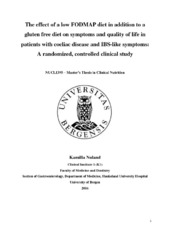| dc.description.abstract | Around 20-30% of coeliac disease patients have IBS-like symptoms. The low FODMAP diet (low in fermentable oligo-, di-, monosaccharides and polyols) is used as treatment for irritable bowel syndrome (IBS) to reduce gastrointestinal symptoms. As far as we know, there are no published papers on low FODMAP diet to patients with coeliac disease. Purpose: We wanted to investigate whether patients with coeliac disease and IBS-like symptoms could have a benefit from using this diet in addition to their gluten free diet, especially regarding abdominal symptoms and quality of life. Traditionally, these have been given advice to further eliminate traces of gluten in their diet. We compared this strategy to a reduction in FODMAPs as instructed by a clinical dietitian. We also wanted to investigate whether a low FODMAP diet would have any effect on the gut microbiota and the degree of fermentation by gut bacteria, measured with breath tests and stool samples (another Master's Thesis). The objective was to investigate whether this is a treatment which can be recommended for coeliac patients with IBS-like symptoms or not. Method: Forty patients with coeliac disease-, and IBS-like symptoms confirmed by the Rome III criteria and score 75 or more on IBS-SSS (Symptom Severity Scale) were included in the study. They were randomized into two groups. Group A followed a more strict gluten free diet for six weeks and were supposed to exclude all wheat starch and food labelled traces of gluten" from their diet. Patients in group B continued to follow a traditional gluten free diet in addition to following a low FODMAP diet for six weeks. Symptoms (Irritable bowel syndrome- Symptom Severity Scale) were recorded at baseline, three and six weeks. Quality of life (SF-36), 4 days prospective dietary intake records, blood tests, breath tests and stool samples were carried out at baseline and after six weeks on their diets. Compliance and satisfaction with the two diets were evaluated by VAS-scales after 6 weeks, and 1 month after the intervention ended in group B. All the patients were given dietary counselling by master students in clinical nutrition. Dietist Net Free was used to calculate the amount of FODMAPs in the diets at baseline and at six weeks. Statistics: T-tests, non-parametric tests, categorical tests, ANOVA, Friedman and correlation tests. Results: Twenty patients were included in each group; group A (18F/2M, age 39±15) and group B (15F/5M, age 43±12). At baseline, 42.5% had constipation problems (IBS-C), 27.5% diarrhoea problems (IBS-D) and 30% both (IBS-M). At baseline, 20% in group A vs. 10% in group B had mild IBS, 45% vs. 65% moderate and 35% vs. 25% severe IBS symptoms. After six weeks there were statistically significant differences between the groups (p=0.0425); 10% vs. 25% were in remission, 15% vs. 45% had mild IBS, 65% vs. 25% moderate and 10% vs. 5% severe. There were 5 patients in group A and 1 in group B that had raised anti-transglutaminase 2 IgA- levels, vs. 2 and 3 with raised anti-deamidated gliadin IgG-levels. The FODMAP intake decreased statistically significant from 7.7 (2.7-19.2) g/day at baseline to 1.3 (0.9-2.1) g/day at six weeks in group B (p=0.0001), vs. a non- significant decrease from 14.5 (10.9-21.6) to12.1... | en_US |
